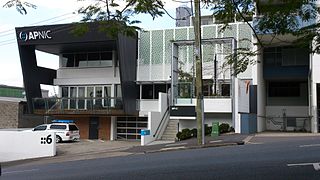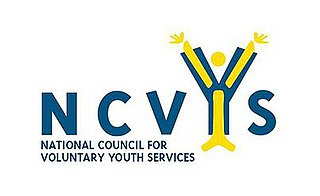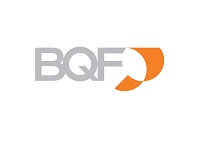
APNIC is the regional Internet address registry (RIR) for the Asia–Pacific region. It is one of the world's five RIRs and is part of the Number Resource Organization (NRO).

The British Computer Society (BCS), branded BCS, The Chartered Institute for IT, since 2009, is a professional body and a learned society that represents those working in information technology (IT), computing, software engineering, computer engineering and computer science, both in the United Kingdom and internationally. Founded in 1957, BCS has played an important role in educating and nurturing IT professionals, computer scientists, software engineers, computer engineers, upholding the profession, accrediting Chartered IT Professional (CITP) and Chartered Engineer (CEng) status, and creating a global community active in promoting and furthering the field and practice of computing.

The Institute of Chartered Accountants in England and Wales (ICAEW) is a professional membership organisation that promotes, develops and supports chartered accountants and students around the world. As of December 2023, it has over 208,000 members and students in 146 countries. ICAEW was established by royal charter in 1880.

The Chartered Institute of Environmental Health (CIEH) is a professional membership body concerned with environmental health and promoting standards in the training and education of environmental health professionals.

The Institute of Directors (IoD) is a British professional organisation for company directors, senior business leaders and entrepreneurs. It is the UK's longest running organisation for professional leaders, having been founded in 1903 and incorporated by royal charter in 1906. The charter charged the IoD with promoting free enterprise, lobbying government and setting standards for corporate governance.

The Chartered Institute of Public Finance and Accountancy (CIPFA) is a UK based organisation for accountants who work in the public sector, accounting firms and other professional bodies where management of public funds are required. CIPFA is the only UK professional accountancy organisation who is dedicated to public financial management. They currently have approximately 14,000 members. They offer qualifications including a professional qualification for public sector accountants as well as a postgraduate diploma for people already working in management.
The Missouri Library Network Corporation (MLNC) was a library consortium founded on October 19, 1981 by the representatives of thirty-one Missouri libraries. In July 2012, MLNC merged with Amigos Library Services of Dallas Texas.
Divers Alert Network (DAN) is a group of not-for-profit organizations dedicated to improving diving safety for all divers. It was founded in Durham, North Carolina, United States, in 1980 at Duke University providing 24/7 telephonic hot-line diving medical assistance. Since then the organization has expanded globally and now has independent regional organizations in North America, Europe, Japan, Asia-Pacific and Southern Africa.
The Australian and New Zealand Institute of Insurance and Finance (ANZIIF), also known as the Institute, is a professional association and education provider for the insurance and financial services industry in the Asia-Pacific region. ANZIIF was founded in 1884, making it one of the oldest professional associations in the region.

The Council of British International Schools (COBIS) serves English International Schools around the globe, representing over 450 Member Schools in 79 countries and over 150 Supporting Associate organisations.
The World Institute for Nuclear Security (WINS) is an international non-governmental membership organisation located in Vienna, Austria. WINS focuses on the operational level of licensees, regulators and other similar stakeholders rather than on the State level (which is the remit of the International Atomic Energy Agency).
The Canadian Professional Sales Association, commonly known as CPSA, is a Canadian association for sales professionals. CPSA is a not-for-profit association with over 15,000 members. CPSA offers professional sales designations, sales training and a membership cost-savings program.
The Archives and Records Association, Ireland is the principal professional body for archivists, archive conservators and records managers in Ireland. It is a semi-autonomous affiliate of the Archives and Records Association. Both the ARA and ARA, Ireland were formed on 1 June 2010 through the merger of the National Council on Archives and the Association of Chief Archivists in Local Government with the Society of Archivists.
The Operational Research Society, also known as The OR Society, is an international learned society in the field of operational research.The OR Society is a leading professional body for operational research (OR) practitioners and academics. Based in the United Kingdom, the society promotes the understanding and use of operational research in addressing real-world problems across various sectors, including industry, government, and academia.
The British-Swiss Chamber of Commerce (BSCC) is an independent not-for-profit organisation founded in 1920 with more than 500 members. It aims to improve business relations between Switzerland, Liechtenstein, and the UK. The BSCC is a forum for debate and networking. The BSCC is composed of corporate, SME, and individual members, who are categorized into four groups, called network, promote, lead, and influence. BSCC members represent the majority of business sectors. Its activities include organising events, providing advisory services and creating a platform for the exchange of information and experience between Switzerland and the UK.
The Faculty of Sexual and Reproductive Healthcare (FSRH) is the leader in the field of sexual and reproductive healthcare, and it is the voice for professionals working in this area. As a multi-disciplinary professional membership organisation, it sets clinical guidance and standards, provides training and lifelong education, and champions safe and effective sexual and reproductive healthcare across the life course for all. It represents over 14,000 healthcare professionals. The organisation believes that access to SRH is a fundamental right. They work together with members and partners to shape better sexual and reproductive healthcare for all.

The National Council for Voluntary Youth Services (NCVYS) was a membership network of over 200 voluntary and community organisations, as well as local and regional networks, that work with and for young people across England. The organisation closed in 2016. For 80 years, NCVYS acted as an independent voice of the voluntary and community youth sector, working to inform and influence public policy, supporting members to improve the quality of their work, and also raising the profile of the voluntary and community sector's work with young people.
The Open Data Institute (ODI) is a non-profit private company limited by guarantee, based in the United Kingdom. Founded by Sir Tim Berners-Lee and Sir Nigel Shadbolt in 2012, the ODI's mission is to connect, equip and inspire people around the world to innovate with data.
The Association of Translation Companies (ATC) is a professional membership association promoting language services in the United Kingdom and beyond. The ATC represents the interests of translation companies operating in the UK's expanding language services industry which is home to over 1,200 translation companies, is worth more than £1 billion and employs more than 12,000 people.
Diver organisations are membership based organisations where the membership is wholly, or at least in large part, underwater divers, and the organisation is intended to further a mutual interest related to underwater diving or the aquatic environment as it affects divers or diving activity. Some organisations have more than one focus of interest.








